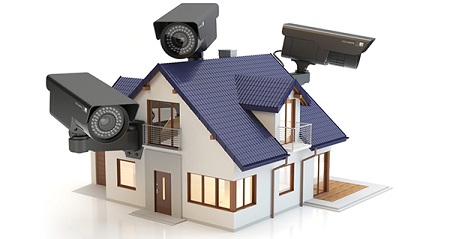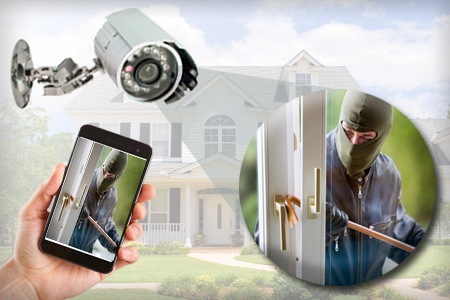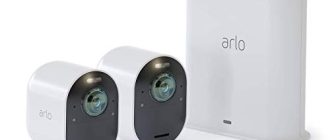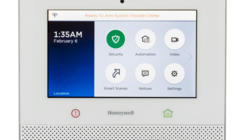
Home Security System: Pros And Cons
Are you concerned about the safety of your home and loved ones? Investing in a home security system may provide the peace of mind you’re looking for. These systems offer various features, including monitoring, cameras, and alarms, to help protect your property from potential threats.
One of the main benefits of a home security system is the added layer of protection it provides. With 24/7 monitoring, you can be sure that help will be on the way in case of an emergency, such as a break-in or fire. In addition, having cameras can deter potential burglars and provide valuable evidence if a crime does occur.
Another advantage of home security systems is the convenience and peace of mind they offer. They can be easily accessed and controlled through smartphone apps, allowing you to monitor your home even when you’re away. This gives you the ability to check on your property, receive real-time alerts, and even control the alarm system remotely.
However, like any product, home security systems have their drawbacks. One of the main concerns is the cost associated with purchasing and maintaining the system. While the initial investment may seem high, the long-term benefits in terms of safety and peace of mind can outweigh the expenses.
Another potential disadvantage is the false alarms that can occur. These alarms may be triggered by pets, family members, or even technical malfunctions. While some false alarms can be easily dismissed, they can still be annoying and may lead to fines or unnecessary police visits.
Overall, home security systems offer a wide range of benefits for homeowners. From enhanced safety and monitoring to convenient control via smartphone apps, these systems provide valuable peace of mind. However, it’s important to consider the potential drawbacks, such as cost and false alarms, before making a decision. Remember to choose a reputable security provider and carefully evaluate your needs to find the right system for you.
Benefits of Home Security Systems
Home security systems offer various benefits for homeowners. Here are some of the advantages of installing a reliable home security system:
- Protection: One of the main benefits of a home security system is the protection it provides. It acts as a deterrent for potential burglars and intruders, keeping your home and belongings safe.
- Safety: A home security system ensures the safety of your family members by providing immediate assistance in case of emergencies. With features like panic buttons and emergency alerts, you can quickly get help when needed.
- Monitoring: Most home security systems come with 24/7 monitoring services. This means that professionals are constantly keeping an eye on your home, alerting you and the authorities if any suspicious activity is detected.
- Pros: Home security systems offer convenience and peace of mind. You can remotely monitor your home through mobile apps or computer systems, allowing you to keep an eye on your property even when you’re not there.
- Cameras: Many home security systems include surveillance cameras, which can be strategically placed to capture any suspicious activity around your property. These cameras not only act as a deterrent, but they also provide evidence in case of a break-in.
Overall, investing in a home security system is a smart choice as it enhances the security and safety of your home.
Protect Your Home
When it comes to the safety of your home and loved ones, investing in a reliable home security system is paramount. With the increasing rate of home burglaries and break-ins, having a robust alarm system in place provides the much-needed security and peace of mind.
One of the main pros of a home security system is the 24/7 protection it offers. Whether you are at home or away, the system ensures that your house is always monitored, keeping intruders at bay. Furthermore, it acts as a deterrent, as potential burglars are less likely to target a house equipped with a visible security system.
In addition to the alarm, modern home security systems also include surveillance cameras. These cameras play a vital role in deterring criminals and capturing any suspicious activities. With the ability to monitor your home remotely, you can easily keep an eye on your property, even when you’re not there.
While the pros of a home security system are evident, there are also a few cons to consider. The initial cost of installation and equipment can be expensive. However, the long-term benefits and peace of mind provided by these systems far outweigh the initial investment.
Another potential downside is the reliance on technology. If the power goes out or there is a malfunction, the system may not function properly. However, most modern security systems have backup power sources and are designed to minimize the risk of failure.
In conclusion, investing in a home security system is a wise decision for anyone looking to protect their home and loved ones. With the multitude of options available, it’s essential to choose a system that suits your specific needs and provides the desired level of security and protection.
Deter Crime
One of the main advantages of installing a home security system is that it can help to deter crime. The presence of security cameras and alarm systems can discourage potential criminals from targeting your property. Criminals are more likely to move on to an easier target if they see that a house is protected by a home security system.
Monitoring is another key feature of a home security system. With 24/7 monitoring, your home is always protected, even when you are not there. This constant surveillance can alert authorities and prevent any break-ins or other criminal activity from occurring.
An effective home security system provides comprehensive protection for your property and your loved ones. It not only deters crime but also ensures timely response in case of any emergency situation. The system can also provide you with peace of mind, knowing that you have taken the necessary steps to safeguard your home.
However, there are some cons to consider when investing in a home security system. The upfront costs of purchasing and installing the system can be quite high, depending on the features and level of security you require. Additionally, some homeowners may find the ongoing monitoring costs to be a financial burden.
Despite these drawbacks, the benefits of having a home security system far outweigh the cons. The additional layer of protection and peace of mind it provides is priceless, especially in today’s world where crime rates are on the rise. Investing in a home security system is a smart decision that can help to keep your family and belongings safe.
Drawbacks of Home Security Systems
While home security systems offer many benefits, there are also some drawbacks to consider. It’s important to understand both the pros and cons before investing in an alarm and monitoring system for your home.
| Cons | Description |
| Limited Protection | Although home security systems provide a level of safety, they may not offer complete protection. Burglars can find ways to bypass the system or target areas not covered by cameras or sensors. |
| False Alarms | False alarms can be a common issue with home security systems. Whether triggered by pets, faulty equipment, or even user error, false alarms can be a nuisance and may result in fines or penalties from local authorities. |
| High Cost | Investing in a home security system can be expensive, especially if you opt for additional features such as surveillance cameras or professional monitoring services. There are upfront costs for equipment and installation, as well as monthly fees for monitoring. |
| Privacy Concerns | Having cameras and sensors in your home can raise privacy concerns, especially if they record or monitor your activities. It’s important to be aware of the privacy policies of your security system provider and ensure your personal information is protected. |
Despite these drawbacks, home security systems can still provide valuable protection and peace of mind for homeowners. It’s essential to carefully consider the pros and cons and choose a system that meets your specific needs and budget.
False Alarms
One of the cons of home security systems is the occurrence of false alarms. False alarms can be triggered by a variety of factors, such as pets, insects, or even sudden changes in the environment. While it is crucial for security systems to be sensitive enough to provide the necessary protection, excessive false alarms can be disruptive and lead to a decrease in response when a real emergency occurs.
False alarms not only create unnecessary panic and anxiety for homeowners, but they can also result in fines from local authorities. In some cases, repeated false alarms may even lead to the cancellation of monitoring services, leaving homeowners without the vital safety net they rely on.
To minimize the occurrence of false alarms, it is essential to choose security cameras and sensors that are designed to distinguish between real threats and false triggers. Additionally, regular maintenance and system checks can help ensure that the security system functions properly and minimizes false alarms.
While false alarms can pose a challenge, it is important to remember the numerous pros of having a home security system. The peace of mind, increased security, and protection it provides far outweigh the occasional inconvenience of a false alarm. By carefully selecting a reliable and high-quality security system and taking appropriate precautions, homeowners can enjoy the benefits without unnecessary interruptions.
Costly Installation
When considering a home security system, one of the cons that you may come across is the cost of installation. Installing a security system can be a significant investment, as it typically involves professional installation and equipment fees.
Many security systems require professional installation to ensure proper setup and functionality. This can add to the overall cost of the system, as you will need to pay for the technician’s time and expertise. Additionally, some systems may require additional equipment, such as cameras or sensors, which can also increase the installation costs.
However, it is essential to remember that the high installation costs are often justified by the level of security and safety that a home security system provides. These systems offer various features, such as cameras, motion sensors, and alarms, which can greatly enhance the protection of your home.
Furthermore, the installation costs are a one-time expense, and once the system is in place, you can enjoy the benefits and peace of mind that it provides. With a properly installed security system, you can have round-the-clock monitoring, allowing you to respond promptly to any potential threats or emergencies.
Overall, while the installation of a home security system may be costly, it is an investment in the safety and security of your home. The pros of having a reliable security system that deters burglars and provides peace of mind far outweigh the cons of the initial installation costs.
| Enhanced security | Costly installation |
| 24/7 monitoring | Requires professional setup |
| Instant alarm notifications | Potential additional equipment costs |
| Deters burglars |
Maintenance Requirements
When it comes to home security systems, maintenance is an essential aspect to consider. Proper maintenance ensures that your system, including cameras and alarms, functions optimally and provides the desired level of security for your home.
One of the main maintenance requirements for home security systems is regular cleaning and inspection of the cameras. Over time, dust and debris can accumulate on the camera lenses, affecting the clarity of the footage. Cleaning the lenses with a soft cloth and lens cleaner will help maintain the quality of the video feed.
Additionally, it is important to inspect the cameras and ensure that they are securely mounted and aligned properly. Loose or misaligned cameras may result in blind spots and compromised surveillance, reducing the effectiveness of the security system.
Another aspect of maintenance is testing the alarm system periodically. This involves checking the batteries of the alarm sensors, ensuring that they are functioning correctly and replacing them if needed. Testing the alarm regularly ensures that it will activate when needed and provides reliable protection for your home.

Furthermore, regular upkeep of your home security system includes monitoring software updates and firmware upgrades. Manufacturers often release updates to improve the system’s functionality and address security vulnerabilities. It is essential to stay up-to-date with these updates to maintain the highest level of security and protection.
Proper maintenance of your home security system will not only ensure its reliability and longevity but also provide peace of mind knowing that your home is adequately protected. By following the recommended maintenance requirements, you can effectively mitigate the cons associated with home security systems and enhance the safety and security of your property.
Privacy Concerns
While home security systems are designed to provide enhanced security and protection for your property and loved ones, it is important to consider the privacy concerns that may arise from their use.
One of the main privacy concerns with home security systems is the potential for unauthorized access to your personal information. With alarm monitoring and surveillance cameras connected to the system, there is always a risk that someone could gain access to the recorded footage or intercept the data being transmitted. This could potentially compromise your privacy and leave you vulnerable to identity theft or other malicious activities.
Another privacy concern is the possibility of the system being hacked. In this digital age, no system is completely immune to cyber attacks, and home security systems are no exception. If a hacker manages to breach the system, they can potentially gain access to your home, disarm the security alarms, and even disable the surveillance cameras. This not only puts your privacy at risk but also undermines the purpose of having a home security system in the first place.
Furthermore, the use of surveillance cameras in home security systems raises ethical concerns regarding privacy. While cameras can provide a sense of security by monitoring your property, they may also intrude on the privacy of your neighbors or passersby. It is important to consider the legality and appropriateness of camera placement to avoid violating the privacy rights of others.
It is crucial to strike a balance between the benefits of home security systems and the potential privacy concerns. Taking steps such as using strong passwords, regularly updating the system’s software, and setting up secure network connections can help mitigate some of the risks. Additionally, being mindful of camera placement and following local regulations can ensure that your security measures do not infringe upon the privacy of others.
Overall, while home security systems offer numerous pros in terms of security and protection, it is essential to be aware of and address the privacy concerns associated with their use. By taking appropriate precautions and being mindful of potential risks, you can maximize the benefits of your home security system while maintaining your privacy.
Types of Home Security Systems
When it comes to ensuring the safety of your home, there are several types of home security systems to choose from. Each system comes with its own set of pros and cons, so it’s important to understand the options available to you.
| Monitored Alarm Systems | – Professional monitoring provides 24/7 protection and immediate response to emergencies – Can be integrated with other smart home devices – May qualify for insurance discounts |
– Monthly monitoring fees – Requires an active internet connection – False alarms can result in fines |
| Camera Systems | – Provides visual surveillance and can deter potential intruders – Can be accessed remotely through a smartphone app – Can provide evidence in case of a break-in |
– Limited coverage area depending on camera placement – Privacy concerns if cameras are placed inside the home – Requires regular maintenance and monitoring |
| Wireless Alarm Systems | – Easy installation and flexibility in system placement – Can be easily expanded or upgraded – No reliance on landline or internet connection |
– Limited range compared to wired systems – Possible interference from other wireless devices – Requires ongoing battery maintenance |
| Smart Home Security Systems | – Integrated with other smart home devices for enhanced security – Can automate routines and provide remote control access – Real-time notifications and alerts for improved peace of mind |
– May require professional installation and setup – Reliance on stable internet connection – Potential vulnerabilities to hacking or system malfunctions |
Before making a decision, consider the specific needs of your home and assess the pros and cons of each type of home security system. A comprehensive security system can provide valuable protection and peace of mind for you and your loved ones.
Wired Systems
Wired home security systems are a popular choice for homeowners who want a reliable and efficient way to protect their homes. These systems use wired cameras and sensors to provide maximum safety and protection.
Pros: One of the main advantages of wired systems is their stability and reliability. Since the cameras and sensors are connected directly to the main control panel, there is less chance of signal interference or hacking. Wired systems also provide better image and video quality, ensuring that you have clear evidence in case of any security incidents.
Cons: One downside of wired systems is the installation process, which can be more time-consuming and complex compared to wireless systems. Since wires need to be run throughout the house, it may require professional assistance and possibly drilling holes in walls. Additionally, if there is a power outage or the wiring gets damaged, the system may be temporarily disabled.
Overall, wired home security systems offer a reliable and robust solution for homeowners who prioritize stability and the highest level of protection. With their direct connection and high-quality components, these systems provide continuous monitoring and peace of mind.
Wireless Systems
One of the latest advancements in home security technology is the use of wireless systems. These systems use wireless cameras and sensors to provide comprehensive security for your home.
The main advantage of a wireless system is its flexibility and easy installation. Unlike traditional wired systems, wireless systems require no drilling or running of wires, which can be time-consuming and costly. With wireless systems, you can easily install cameras and sensors in any desired location without the need for professional assistance.
Another pro of wireless systems is that they can be easily expanded and upgraded. If you decide to add more cameras or sensors to your system, you can do so without any hassle. Additionally, if new features or technologies become available, you can easily upgrade your system to take advantage of these advancements.
Wireless systems also offer the advantage of remote monitoring. With a wireless system, you can access live footage from your cameras and monitor your home’s security from anywhere, using your smartphone or computer. This means that you can keep an eye on your property and loved ones even when you’re not at home.
However, there are some cons to consider when it comes to wireless systems. One potential downside is the reliance on batteries for power. Wireless cameras and sensors require batteries to function, and these batteries will need to be replaced periodically. This can be a minor inconvenience and an additional cost.
Another con is the potential for signal interference. Since wireless systems rely on radio waves to transmit data, they can be susceptible to signal interference from other wireless devices or even physical obstructions. This could potentially impact the performance and reliability of your system.
Despite these cons, wireless systems offer a high level of security, convenience, and flexibility. With their easy installation, expandability, and remote monitoring capabilities, they are an excellent choice for those looking to enhance the safety of their homes.
Monitored Systems
Monitored home security systems are an effective way to ensure the safety and protection of your home and loved ones. With the latest technology and advanced security features, these systems provide round-the-clock monitoring and surveillance.
One of the main advantages of monitored systems is the presence of cameras. These cameras are strategically placed around your home to provide maximum coverage and visibility. They capture high-quality video footage, which can be useful for identifying potential intruders or criminal activities.
In addition to cameras, monitored systems consist of a comprehensive security system that includes sensors, alarms, and other devices. These components work together to detect any unauthorized access or suspicious activities. Once a breach is detected, the system promptly triggers an alarm, alerting both you and the monitoring center.
One of the key benefits of monitored systems is the constant monitoring provided by a professional security company. These companies have trained operators who monitor your home security system 24/7. In case of an alarm activation, they will immediately contact you and send help if needed.
However, like any other system, monitored home security systems also have their cons. One of the drawbacks is the cost associated with monitoring services. While the investment may seem high, the peace of mind and added protection provided by these systems often outweigh the cost.
Another potential con is the reliance on external monitoring. If the monitoring center experiences any technical difficulties or disruptions, there may be delays in response time. It’s important to choose a reputable and reliable monitoring company to minimize the risk of such issues.
In conclusion, monitored home security systems offer a comprehensive level of protection for your home and family. With the combination of cameras, sensors, alarms, and professional monitoring, you can have peace of mind knowing that your property is being constantly watched and any potential threats will be promptly addressed.
Unmonitored Systems
In addition to monitored security systems, there are also unmonitored systems available on the market. While monitored systems provide round-the-clock monitoring and professional assistance, unmonitored systems do not come with professional monitoring services.
The main advantage of unmonitored systems is cost savings. Since there is no monthly fee for monitoring services, unmonitored systems are generally more affordable than their monitored counterparts.
However, there are also several cons to consider when opting for an unmonitored system. Without professional monitoring, you are solely responsible for your security. In the event of a break-in or emergency, there won’t be a professional monitoring team to respond and contact the authorities on your behalf.
Unmonitored systems also lack the same level of security and safety as monitored systems. Monitored systems often come with additional features such as video surveillance cameras and alarm systems. These extra layers of protection can provide peace of mind and deter potential intruders.
It’s important to note that unmonitored systems may still have some level of self-monitoring capabilities. This means that you can receive alerts or notifications on your smartphone whenever an event or alarm is triggered. However, you will need to take action and contact the authorities yourself.
In summary, unmonitored systems offer cost savings but come with the trade-off of reduced security and safety. It is crucial to weigh the pros and cons carefully before deciding which type of home security system is best suited for your needs.
Features to Consider
When choosing a home security system, there are several features to consider that can enhance the level of protection and security it provides.
Alarm: Look for a system that includes a loud alarm, as this can deter intruders and alert you and your neighbors to potential break-ins.
Monitoring: Opt for a system with professional monitoring services, where trained specialists are alerted when an alarm is triggered. They can then contact you and emergency services if necessary.
Cameras: Consider a security system that includes surveillance cameras. These cameras can provide visual evidence in case of a break-in and help you monitor your property remotely.
Pros: Evaluate the pros of each system you are considering, such as ease of installation, user-friendly interface, and additional features like home automation integration or smartphone control.
Cons: Take into account the cons of each system as well. This may include higher upfront costs, monthly fees for professional monitoring, or potential false alarms.
System: Assess the overall system, including its compatibility with your home and existing security measures. Make sure the system is reliable and has all the necessary components for comprehensive protection.
Protection: Consider the level of protection the system offers. Look for features like door and window sensors, motion detectors, and glass-break sensors to ensure thorough coverage.
By considering these features, you can select a home security system that meets your specific needs and provides you with peace of mind.
Q&A:
What are the main advantages of home security systems?
Home security systems offer several benefits. Firstly, they provide protection against burglaries and break-ins. A well-installed and monitored system can serve as a deterrent to potential burglars, as they are more likely to target homes without security measures. Secondly, these systems can immediately alert homeowners and authorities if there is a threat, such as a fire or carbon monoxide leak. This can help in preventing serious damage or even saving lives. Additionally, some home security systems come with home automation features, allowing homeowners to remotely control various aspects of their home, including lighting, temperature, and door locks.
Do home security systems have any disadvantages?
Although home security systems offer numerous advantages, there are some potential downsides to consider. Firstly, the cost of purchasing and installing a system can be quite expensive. Additionally, many systems require a monthly subscription fee for monitoring services, which can add to the cost. Furthermore, false alarms can occur, which can be an inconvenience to homeowners and may even result in fines depending on local regulations. Finally, some people may have concerns about privacy due to the fact that these systems often include cameras and sensors that record activity within the home.
How does a home security system work?
A home security system typically includes various components such as sensors, cameras, and a control panel. The sensors are placed on doors and windows or in other areas of the home and detect motion or when a door or window is opened or broken. When a sensor is triggered, it sends a signal to the control panel, which then activates an alarm and/or alerts the monitoring company. The monitoring company will then contact the homeowner and, if necessary, dispatch emergency personnel. Some systems also have the ability to send alerts directly to the homeowner’s smartphone via a mobile app.
Are home security systems easy to install?
The ease of installation of a home security system can depend on the specific system and the level of technological expertise of the homeowner. Some systems are designed to be easily installed by the homeowner without the need for professional assistance. These systems typically come with detailed instructions and may include wireless components that can be easily mounted or placed in desired locations. However, more complex systems that include wired components or require drilling may be best installed by a professional. It’s important to carefully read the installation instructions and consider your own abilities before attempting to install a home security system.






